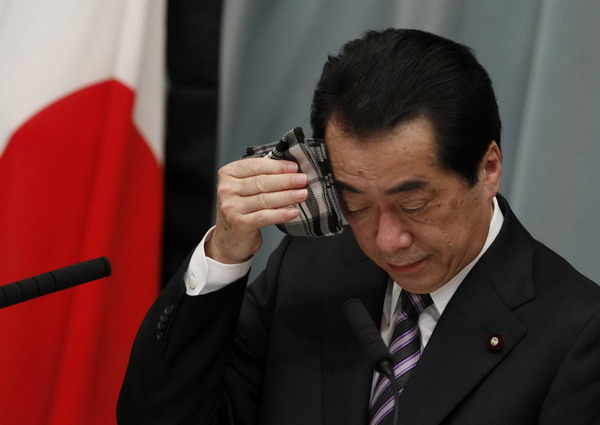Nuclear Meltdown
Japan's PM vows to win battle against nuke plant
(Agencies)
Updated: 2011-04-01 19:46
 |
Large Medium Small |
TOKYO- Japan's prime minister sounded a resolute note Friday, promising to win the battle against an overheating nuclear plant even as atomic safety officials raised questions about the accuracy of radiation measurements at the complex.
Japan will "do whatever it takes to win the battle" at Fukushima Daiichi, Kan said in a televised news conference. And when the crisis ends: "We will establish a system that could respond to any situation based on an assumption that anything could happen."
While a massive earthquake and tsunami set off a series of events that disabled the plant, the accident has been exacerbated by several missteps along the way. Apparently spotting another mistake Friday, the nuclear safety agency ordered the Tokyo Electric Power Co to review its recent radiation figures, saying they seemed suspiciously high.
TEPCO has repeatedly been forced to retract such figures, fueling fears over health risks and eroding confidence in the company's ability to respond effectively to the crisis.
Among the measurements called into question was one from Thursday that TEPCO said showed groundwater under one of the reactors contained iodine concentrations that were 10,000 times the government's standard for the plant, the safety agency's spokesman Hidehiko Nishiyama said. Seawater and air concentrations from this week also are under review.
"We have suspected their isotope analysis, and we will wait for the new results," Nishiyama said, adding that the agency thinks the numbers may be too high.
TEPCO has conceded that there appears to be an error in the computer program used to analyze the data, but spokesman Junichi Matsumoto insisted that the glitch only affected readings for two radioactive isotopes, neither of which was iodine or other readings that have raised recent radiation concerns.
The Nuclear and Industrial Safety Agency has held out the possibility that a complete review of all radiation data collected since the tsunami might eventually be ordered.
In any case, it appears radiation is still streaming out of the plant, underscoring TEPCO's inability to get it under control. The company has increasingly asked for international help in its uphill battle, most recently ordering giant pumps from the U.S. that were to arrive later this month to spray water on the reactors.
Though experts have said radiation seeping into the ground under the plant is unlikely to reach drinking supplies, there are two ways that could happen.
One is if it were to seep into wells in the area. For now, a 12-mile (20-kilometer) radius around the plant has been cleared, though residents of the area are growing increasingly frustrated with evacuation orders and have been sneaking back to check on their homes.
The other concern is that contaminated water from the plant could eventually make its way into rivers used for drinking water. Tomohiro Mogamiya, an official with the Ministry of Health, Labor and Welfare's water supply division, said that was "extremely unlikely" since groundwater would flow toward the ocean, and the plant is right on the coast.
The two closest filtration plants for drinking water have both been shut down because they are just inside the exclusion zone.
"When people return to the area we will test the water to make sure it is safe," said Masato Ishikawa, an official with the Fukushima prefecture's food and sanitation division.
| 分享按钮 |




